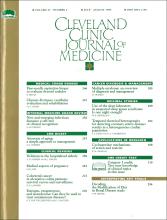ABSTRACT
BACKGROUND Newer immunosuppressive agents are permitting transplantation to be performed more frequently.
OBJECTIVES To review the mechanisms of action and toxicity of cyclosporine.
DISCUSSION Graft rejection is mainly cell-mediated, although a humoral (antibody) response may also be involved. Cyclosporine and related agents such as FK-506 and rapamycin selectively inhibit adaptive immune responses by blocking T cell dependent biosynthesis of lymphokines, particularly interleukin 2at the level of messenger ribonucleic acid (mRNA) transcription. Because cyclosporine is metabolized in the liver by P-450 enzymes, drugs that affect the P-450 system also affect the metabolism of cyclosporine. Hypertension is the most common side effect of cyclosporine. Cyclosporine-induced "nephrotoxicity" may be functional rather than anatomic, caused primarily by preferential constriction of the afferent renal arteriole. Bacterial and fungal infections are less common with regimens of cyclosporine plus prednisone than with azathioprine plus prednisone. Nevertheless, cyclosporine-treated patients are vulnerable to viral infections.
CONCLUSIONS Although cyclosporine and related compounds represent an improvement over earlier immune suppressive agents, they produce serious side effects with which the practitioner should be familiar.
- Copyright © 1994 The Cleveland Clinic Foundation. All Rights Reserved.






